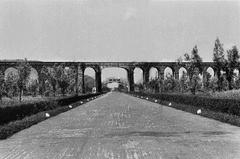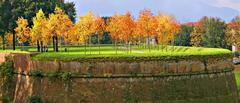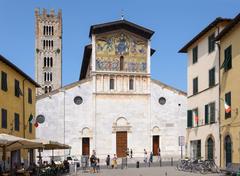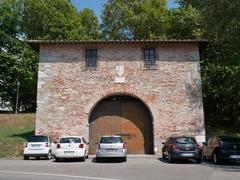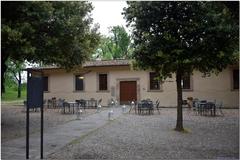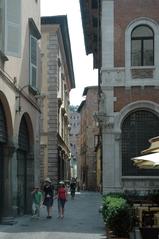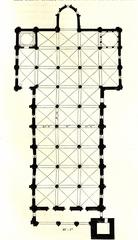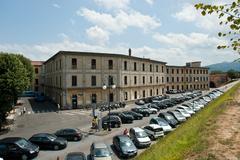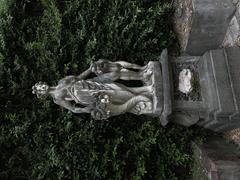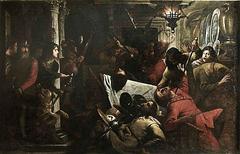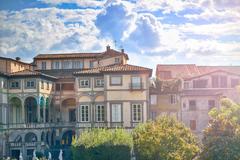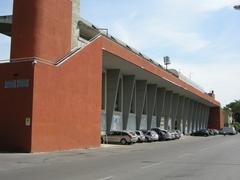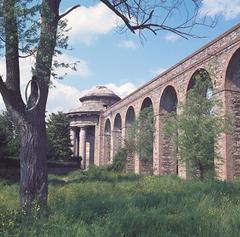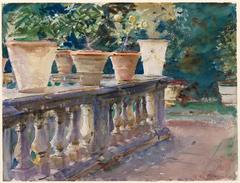Center Of Contemporary Art Lucca: Visiting Hours, Tickets, and Comprehensive Guide
Date: 14/06/2025
Introduction
Set within Lucca’s medieval heart, the Lucca Center of Contemporary Art (Lu.C.C.A.) was a celebrated institution that bridged the city’s Renaissance heritage with the pulse of modern creativity. Housed in the distinguished 16th-century Palazzo Boccella, Lu.C.C.A. offered a vibrant space where contemporary art and historical architecture existed in dynamic dialogue, drawing art lovers, families, and tourists. Though Lu.C.C.A. has now permanently closed, its legacy continues to shape Lucca’s cultural scene, and this guide details its history, architectural significance, visitor information, and the best alternative art experiences the city now offers.
For further details and updates, consult resources such as lucca.com, dovealucca.it, and myartguides.com.
Table of Contents
- Introduction
- Historical Background & Architectural Features
- Museum Layout & Design
- Visiting Hours & Ticket Information
- Visitor Experience & Accessibility
- Alternative Cultural Sites & Art Events in Lucca
- Frequently Asked Questions (FAQ)
- Conclusion
- References
Historical Background & Architectural Features
Origins & Establishment
Lu.C.C.A. was established in the early 21st century as Lucca’s primary venue for modern and contemporary art. The transformation of the 16th-century Palazzo Boccella into a “white box” museum reflected the city’s ambition to foster innovation while honoring its history (lucca.com; dovealucca.it; myartguides.com).
Palazzo Boccella: History & Architecture
Palazzo Boccella’s 16th-century origins and proximity to Piazza dell’Anfiteatro and the city’s Renaissance walls made it a strategic and evocative home for Lu.C.C.A. During its transformation, the building’s historic frescoes, wooden coffered ceilings, and noble features were preserved and integrated into the modern interior, emphasizing a harmonious blend of the past and present (dovealucca.it; lucca.com).
Museum Layout & Design
Exhibition Spaces
Spanning five floors, Lu.C.C.A.’s main exhibition halls were designed as flexible “white box” galleries, equipped with advanced lighting and climate control for optimal display and preservation of art. The ground floor featured reception, bookshop, café, and lounge areas, while upper levels housed exhibition halls, a children’s playroom, and administrative offices. Historic architectural details were carefully preserved and highlighted, allowing visitors to experience both art and heritage simultaneously (myartguides.com).
Accessibility & Facilities
Lu.C.C.A. was fully accessible, with elevators, ramps, and stairlifts ensuring barrier-free movement. Facilities included cloakrooms, accessible restrooms, and seating throughout. The museum’s layout and signage supported visitors of all ages and abilities (lucca.com).
Technological & Environmental Systems
Equipped with advanced climate control, security, and fire safety systems, Lu.C.C.A. met the highest standards for art preservation and visitor safety. Exterior and interior lighting were designed for both function and dramatic architectural effect, with nighttime illumination marking the museum as a cultural beacon (dovealucca.it).
Visiting Hours & Ticket Information
Note: Lu.C.C.A. is now permanently closed (WhichMuseum). Before closure, it operated Tuesday–Sunday, 10:00 AM–7:00 PM, with last admission at 6:30 PM. Tickets were typically €8–€12, with reduced rates for students, seniors, and children.
For updated information on cultural venues and events in Lucca, consult lucca.com, dovealucca.it, and Lucca WhatsOn.
Visitor Experience & Accessibility
Lu.C.C.A. welcomed a diverse audience, offering guided tours, workshops, and innovative museotherapy programs. The museum was known for its inclusive approach, family-friendly facilities, and educational initiatives. Visitors enjoyed a seamless experience, from accessible entryways and clear signage to a welcoming café and bookshop.
Alternative Cultural Sites & Art Events in Lucca
With Lu.C.C.A.’s closure, visitors can still immerse themselves in Lucca’s rich cultural fabric:
Museums & Historic Venues
- Museo Nazionale di Palazzo Mansi: Baroque art and textiles in an opulent palace (WhichMuseum).
- National Museum of Villa Guinigi: Art from the Etruscan era to the 18th century.
- Palazzo Pfanner: Elegant gardens and rotating exhibitions.
- Puccini Museum: Celebrating the composer’s legacy.
Contemporary Art Events
- Lucca Art Fair: An annual event at the Real Collegio di Lucca, featuring modern and contemporary art, artist projects, and workshops (Italy by Events; Lucca WhatsOn).
- Fossi dell’Arte: Open-air visual arts festival in Piazza San Francesco.
- Temporary Exhibitions: Pop-up shows and artist collectives in historic venues keep contemporary art alive in the city.
Music & Performing Arts
- Sagra Musicale Lucchese: Sacred and classical music festival.
- Puccini Festival: Major opera event in nearby Torre del Lago.
- Teatro del Giglio: Opera, ballet, and modern performances.
Markets & Community Events
- Lucca Antiques Market: Every third weekend.
- Meraki Market & English Mondays: Local creativity and cultural exchange.
Practical Tips
- Always check opening hours and ticket policies of alternative venues.
- Plan ahead for major festivals and fairs.
- Explore historic venues for temporary contemporary art shows.
- Use community events to connect with locals and artists.
- For up-to-date listings, visit Lucca WhatsOn and Allevents.in.
Frequently Asked Questions (FAQ)
Q: Is the Lu.C.C.A. still open?
A: No, the Lu.C.C.A. is permanently closed (WhichMuseum).
Q: Where can I experience contemporary art in Lucca now?
A: Visit the Lucca Art Fair, pop-up exhibitions, and local galleries. Many historic venues host temporary contemporary art shows (Italy by Events; Lucca WhatsOn).
Q: What are the best resources for current cultural events in Lucca?
A: Lucca WhatsOn, Allevents.in, and the city’s tourist offices.
Q: Are other Lucca museums accessible and family-friendly?
A: Yes, most major museums in Lucca are accessible and offer family programs.
Conclusion
Though the Lucca Center of Contemporary Art has closed its doors, its spirit endures in Lucca’s ongoing commitment to the arts. The city’s rich calendar of festivals, exhibitions, and community events ensures that both residents and visitors can continue to enjoy dynamic cultural experiences. For those seeking the intersection of history and innovation, Lucca’s museums, piazzas, and temporary art spaces remain essential destinations.
Stay informed by consulting reputable sources and local event calendars, and consider downloading the Audiala app for interactive guides and real-time cultural updates.
